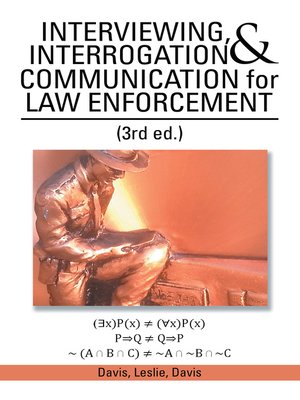
Sign up to save your library
With an OverDrive account, you can save your favorite libraries for at-a-glance information about availability. Find out more about OverDrive accounts.
Find this title in Libby, the library reading app by OverDrive.



Search for a digital library with this title
Title found at these libraries:
| Loading... |
This book provides an overview of effectively collecting, understanding, and presenting information. First, this book examines various situations via math, grammar, and logic. It is important for officers to apply math and English to the law so that they may be able to effectively articulate their actions in court. For example, laws and police actions can be evaluated via truth tables and Venn Diagrams. Second, this book discusses interrogation techniques and body language. Manipulating a suspect and collecting the right information in a legal and effective manner is a part of police work. Third, this book presents a deposition. The defense lawyer may ask certain questions in order to discredit the officer or to undermine the officer's report. Police officers should ask themselves the purpose of each question that is being asked during a deposition. Fourth, this book presents some resume information and typical job interview questions for potential police officers. Knowing what kinds of questions will be asked during an interview and effectively communicating to potential employers is essential. Fifth, this book discusses code information and handwriting comparisons. Code information may be important in a prison environment and handwriting comparisons allows for a totality of circumstance exercise. Sixth, this book discusses assumptions and limitation associated with information. Magic is a useful tool to demonstrate how flawed assumptions may lead to inaccurate conclusions. Seventh, this book provides a table that can be used to generate impromptu speeches. Various words can be randomly selected and the reader can use the words to create a short story. Eighth, this book discusses how to handle situations that deal with special situations and individuals who have disabilities. Finally, this book discusses various search techniques for evidence collection.






